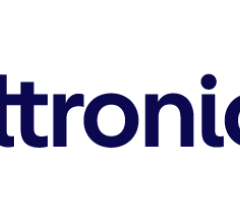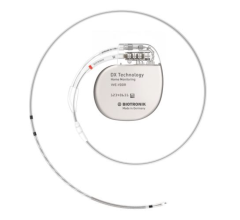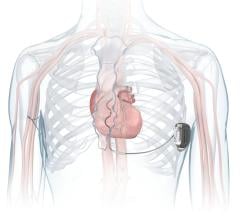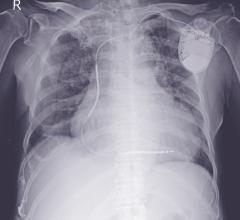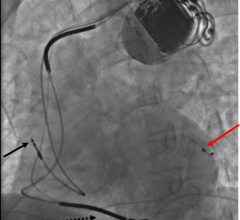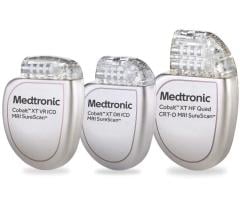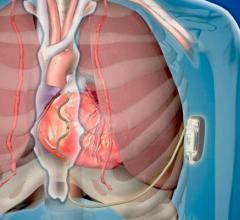November 11, 2008 - New data presented today at the America Heart Association's 2008 scientific sessions by Medtronic shows survival among patients with implantable cardioverter-defibrillators (ICDs) treated only with anti-tachycardia pacing (ATP) was superior to patients who experienced at least one shock-treated episode, demonstrating the clinical benefit of ATP.
Additionally, the analysis evaluating more than 2,000 patients, found no link between inappropriate therapy and mortality, nor a causal relationship between ICD therapy (ATP or shock) and mortality. ATP allows most patients with ICDs to receive painless pacing pulses to safely and effectively terminate dangerous ventricular tachyarrhythmias, those rapid, abnormal rhythms in the lower chambers of the heart that can result in sudden cardiac arrest.
In the analysis, there were 3,630 treated tachyarrhythmia episodes, of which 97 percent were classified as either ventricular tachycardia (VT) or fast VT (FVT), irregular heart rhythms ranging from 100-300 beats per minute, which are treatable by an ICD.
Of these episodes for which therapy was delivered, 80.2 percent were successfully treated with ATP. Analysis also showed 91.9 percent of 2,176 treated VT episodes were successfully terminated by ATP, without the need for a shock. And 68.2 percent of 1,339 treated FVT episodes were terminated by ATP, without the need for a shock.
“Today’s highly advanced ICDs can deliver both painless ATP therapy as well as a high-energy shock, if needed, to terminate dangerous heart rhythms and save lives,” said Michael O. Sweeney, M.D., director, cardiac pacing and implantable device therapies, Brigham and Women’s Hospital, and who led the analysis. “Previous studies of ATP technology have proven its ability to improve patients’ quality of life by reducing discomfort sometimes associated with life-saving shocks.”
He continued, “This new data suggests that aggressive use of ATP as part of a broad strategy to reduce shocks may not only improve patient tolerance of the therapy but also may further enhance the life-saving benefit of ICDs beyond what has been shown in previous studies. This analysis provides further evidence that ATP should be routinely programmed in all ICD patients.”
Several landmark clinical trials have proven the benefits of ICD therapy, Medtronic said. Most recently, the Medtronic-supported SCD-HeFT (Sudden Cardiac Death in Heart Failure) trial showed that ICDs reduced all-cause mortality by 23 percent compared to placebo and ICDs were superior to drug therapy ICDs terminate 98 percent of potentially life-threatening arrhythmias.
Medtronic said it has led the way in developing technologies to better understand and reduce shock. It was the first company to introduce ATP in an ICD in 1993. The result is a clinically proven programming strategy and technology to safely reduce shocks. Data has previously shown that some arrhythmias, including VT, can be terminated painlessly with ATP. ATP is designed to send a short series of impulses to the heart to short-circuit dangerously accelerated rhythms, and has been clinically proven to reduce three out of four shocks and positively impact patient quality of life, the company said.
The analysis was based on data from a total of 2,135 patients in four Medtronic-supported clinical trials: PainFREE Rx, PainFREE Rx II, EMPIRIC (Comparison of Empiric to Physician-Tailored Programming of Implantable Cardioverter-Defibrillators), and PREPARE (The Primary Prevention Parameters Evaluation). Each of these studies was designed to evaluate the benefits of using ATP prior to resorting to high-energy shocks to terminate irregular heart rhythms. These four studies confirmed that ATP is highly effective, reduces shocks and improves patient quality of life, with no added risk of syncope or heart rate acceleration.
The pooled analysis sought to better understand the risk of all-cause mortality based on baseline patient characteristics, the type and length of the arrhythmia, and the therapy used to treat the event. Average follow up across the studies was 10.8 months, with 21.7 percent of patients experiencing VT/VF, with or without shocks.
The analysis showed that baseline age, New York Heart Association (NYHA) class for heart failure, and history of coronary artery disease (CAD) increased the risk of mortality, while use of a beta-blocker and a history of remote myocardial infarction (>6 months ago) decreased mortality risk. It also found that episodes of true VT, FVT and ventricular fibrillation (VF) were significant predictors of mortality. Left untreated, these arrhythmias may lead to sudden cardiac arrest, which itself is fatal 95 percent of the time without therapy.
For more information: www.medtronic.com


 January 13, 2026
January 13, 2026 

